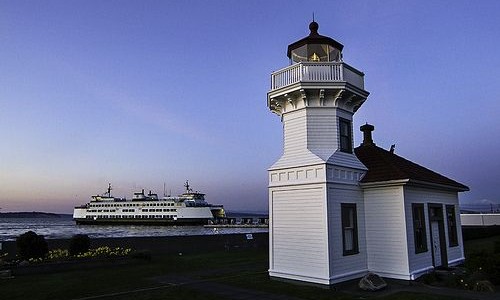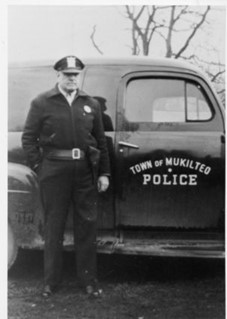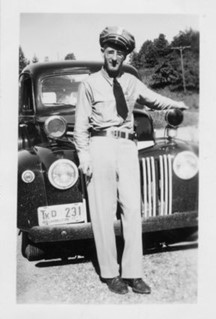By Tina Dickson
Speeding on 5th St, congestion due to ferry traffic, barking dogs. These are some of the things that have been affecting the residents of Mukilteo since the early 1900’s and are still an issue today. As one of the oldest inhabited areas on Puget Sound, Mukilteo was home to a large lumber mill, a hotel, and several commercial establishments. Until the 1940’s Mukilteo was not yet incorporated as a town and the residents looked after themselves. With only about 600 residents, doors were not locked and people policed themselves.
A group of businessmen got together and formed what they named the Improvement Club. They worked to make the community better and enhance the area by improving the roads, cleaning up the local cemetery, and improving the lighting. They felt that more could be done by incorporating the area to become the Town of Mukilteo. An election was held in 1947 and incorporation was approved, along with the selection of a mayor and council. At the time of incorporation, the southern border of Mukilteo was near the present location of Olympic View Middle School.
One of the first duties of the new town council was to ensure that Mukilteo was a safe place. They hired Marvin Wilson as the part-time Marshall, Fire Chief, and head of the Street Department. Most days Marvin could be found driving the road grader, improving the streets. For his policing duties he used his own car which he outfitted with a siren and flashing red light that he borrowed from the fire department. He was paid about $1.00 an hour and also got reimbursed by the city for use of his own car at the rate of 15 cents per mile.
Marvin resigned as Marshall in 1951 and Charlie Hurd was named to the position. Around this time the town purchased its first police vehicle. But Charlie had to put in a request to the council for the purchase of a new siren and light so that he could return the current ones to the Fire Department.
Charlie was the only police officer for this small town which had grown to about 800 residents and he took it upon himself to keep order. Even though the roads were not up to today’s standards there were still complaints of speeding, especially on 5th St. and on the Mukilteo Speedway.
Unlike today with our 911 system and high level of communication, in the 1950s information was passed by word of mouth. At town council meetings complaints were aired and the council would direct the Marshall to handle them. This could entail buying and installing speed limit signs, talking to the owners of barking dogs, or doing extra patrol on Front Street (especially Saturday nights) to prevent petty thievery. The council also requested that Charlie help sell dog licenses. One complaint that never seemed to get resolved was that of ferry traffic/congestion. Even with letters to the Washington State Toll Bridge Authority and to the governor, a solution had not been found.
In 1954 Wally Brodniak was named Marshall when Charlie resigned. Two years later a Deputy Marshall was hired by the town. As before, direction came from the town council. Speeding was still an issue. In spite of additional speed limit signs being posted, the Deputy Marshall was directed by the council to do extra patrol during the day. All of this was done with one police car, with the Marshall and Deputy trading off.
Mukilteo purchased a 1955 Ford V-8 for $1700 to replace the police “van” that had been in use for many years. Soon a new radio system was installed in the police car and was brought up to the standards of the Snohomish County Sheriff for better communication among agencies.
More changes were in store for the growing town of Mukilteo. John Nunnally was hired as the new Marshall (still not a full-time position) in 1958. He was sent to Ft. Lewis to attend a Basic Law Enforcement training class put on by the FBI becoming the first police officer in Mukilteo to receive any training in police work. In 1959 the Marshall became a full-time position which paid $400 per month.
Around this time, the council enacted a curfew for the teenagers of the town. Marshall Nunnally was a very positive force for the young people of Mukilteo. He did well at working with the kids and their parents rather than sending them into the detention center in Everett. And all of the teen drivers were sure that his presence was everywhere. The teens did not dare speed on 5th St! Little did they know that as a deterrent, at various times during the day he parked his patrol car on the street and walked home.
As the population approached 1000 Chief Nunnally became the full-time Marshall and Bill Drew was hired in 1964 as Deputy Marshall to help him. When Chief Nunnally retired in 1967, Bill Drew was named Chief. During his tenure, the Police Department office moved from the basement of the old fire department garage at 3rd and Park, to a portable next to Rosehill Community Center. When Bill retired in 1979, Roger Stam became police chief and there were three men on the department to serve the community of 1200 residents. Four years later the office moved again to the site of a former mortuary/cemetery at 76th and 44th, where the Mukilteo Community Garden is now located. The population was about 5600 when Roger Stam retired in 1990.
Since 1987 Mukilteo has had two annexations, the second one in 1991 included the Harbor Point area to the south which increased the population to 13,000. The Police station moved two more times, and the staffing and certification has increased to meet the demands of the larger population. With technology and the 911 system, communication has improved police responses to meet our needs. Something the previous Marshalls/Police Chiefs mentioned is how they felt like they knew most of the people of the town. With the rapid growth that part of their job has been lost.
Some things have never changed. There is still speeding on the Speedway and on 5th St, there is still congestion and traffic problems caused by the ferry, and there are still complaints of barking dogs.
Originally published in the 7/28/2020 issue of the Mukilteo Beacon.


